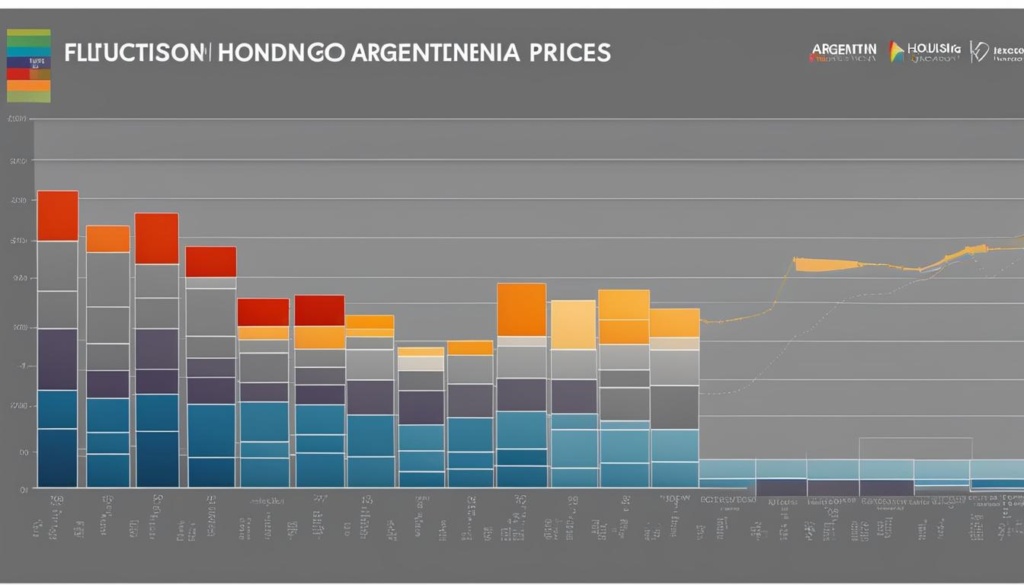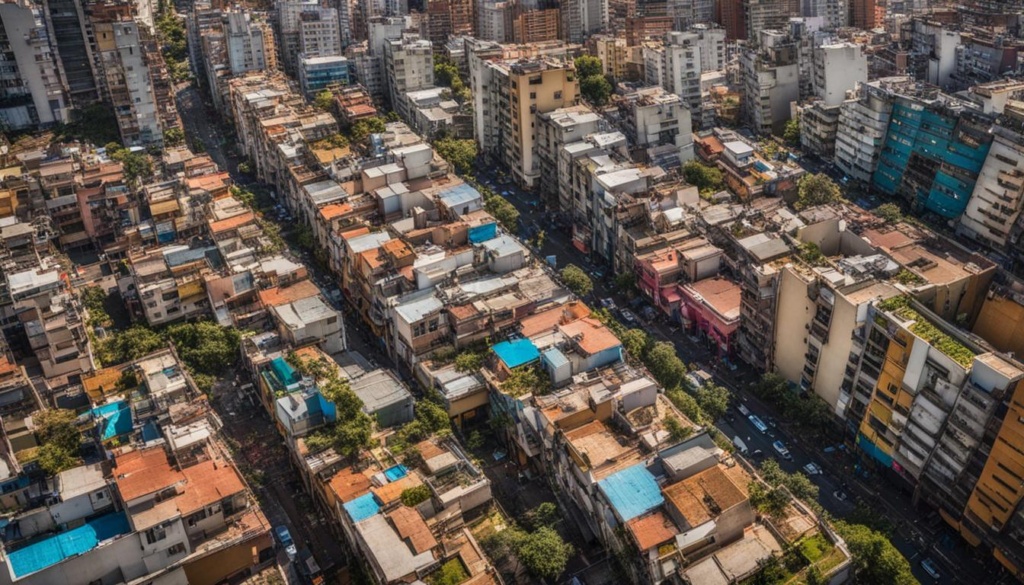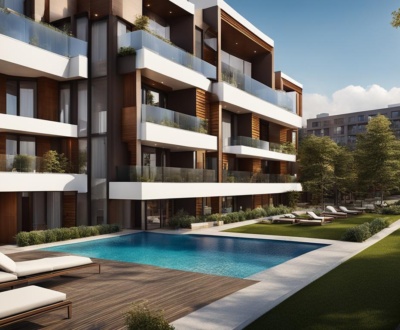Welcome to our Argentina Real Estate News series, where we explore the latest market trends and offer valuable tips for investors, homeowners, and industry stakeholders. In this series, we’ll dive deep into the analysis of the real estate market in Argentina, providing you with the insights you need to make informed decisions.
Argentina’s real estate market is a fascinating arena, shaped by a complex interplay of factors such as housing affordability, government policies, regulatory changes, and economic conditions. Over the years, the country has faced challenges like high inflation, economic recession, and political instability, which have influenced the real estate sector.
Foreign investors have shown a keen interest in Argentina, attracted by incentives and the potential for high rental yields. However, economic volatility, currency devaluation, and complex bureaucracy also pose risks to real estate investment in the country.
In this series, we’ll examine the current state of Argentina’s economy, its impact on the real estate market, and the outlook and forecast for the future. We’ll also discuss housing prices, market timing, risks and challenges, competitive dynamics, recent offers, and rental opportunities in specific zip codes. Additionally, we’ll explore the impact of natural hazards and environmental risks on homes in Argentine.
Whether you are a seasoned investor, a prospective home buyer, or simply interested in the Argentine real estate market, our comprehensive analysis and expert tips will be your guide in navigating this vibrant and ever-evolving industry.
How’s the Economy in Argentina Doing?
The real estate market in Argentina is closely tied to the country’s economic performance, which has historically experienced cycles of boom and bust. These economic fluctuations have a significant impact on the housing market, influencing factors such as affordability, rental demand, and government policies.
One of the major challenges in the Argentina real estate market is affordability, primarily due to high inflation. As prices rise, it becomes increasingly difficult for potential homebuyers to enter the market. This affordability issue is a barrier for many individuals and families looking to purchase a property.
Rental markets in Argentina also experience shifts in demand during times of economic uncertainty. When potential buyers are hesitant to invest in real estate due to economic instability, they often opt for renting instead. This leads to increased demand for rental properties, which can be an attractive investment opportunity for landlords.
The Argentine government plays a crucial role in shaping the real estate market through its policies. To stimulate the market, the government introduces various initiatives, including tax incentives and subsidized mortgage programs. These policies aim to make homeownership more accessible and encourage investment in the real estate sector.
Regulatory changes in mortgage lending and efforts to combat money laundering also impact property transactions in Argentina. These changes help improve transparency and security in real estate transactions, providing a more stable investment environment.
Investing in real estate in Argentina is often considered a safe haven, especially during times of economic volatility. Real estate assets provide a tangible and solid investment option, which can protect investors against inflation and currency devaluation.
However, it’s important to note that real estate investment in Argentina also carries risks due to economic instability. Fluctuations in the economy can impact property values and rental yields, making it essential for investors to carefully evaluate market conditions and seek professional advice.
| Factors | Impact on Real Estate Market |
|---|---|
| Affordability | Challenges potential buyers due to high inflation |
| Rental Demand | Increases during economic uncertainty as individuals opt for renting |
| Government Policies | Provide incentives and programs to stimulate the market |
| Regulatory Changes | Affect property transactions and improve security |
| Economic Instability | Carries risks but considered a safe haven for investment |
Outlook and Forecast for Argentina’s Real Estate Market
When it comes to the Argentina real estate market, forecasting future trends requires a comprehensive analysis of various factors, including inflation rates, government policies, and global economic trends. Over the years, Argentina’s economy has undergone cycles of inflation and instability, which have had a significant impact on the real estate sector.
Cities such as Buenos Aires, Córdoba, and Rosario have traditionally experienced rapid growth due to their robust economic activities. However, it is important to note that regional growth in the real estate market is influenced by both urban and rural areas. Understanding these dynamics is crucial when making investment decisions in different parts of the country.
Economic forecasts for Argentina, in general, suggest stability and long-term growth potential. Despite the challenges posed by economic volatility, the market shows resilience and the potential for positive outcomes. The government’s policies and initiatives in 2024 are likely to focus on housing affordability, foreign investment regulations, and real estate transaction taxation.
“Improved economic conditions and successful policies can have a positive impact on the Argentina real estate market,” explains Juan Martinez, a real estate expert. “These factors play a vital role in shaping investment opportunities and market trends.”
To provide a clearer overview of the outlook and forecast for Argentina’s real estate market, refer to the following table:
| Factors | Impact |
|---|---|
| Inflation Rates | Affects property values and affordability |
| Government Policies | Can stimulate or restrict the real estate market |
| Global Economic Trends | Influence foreign investment and market confidence |
By analyzing these factors, potential investors can gain valuable insights into the market’s trajectory. It is recommended to keep a close eye on up-to-date economic indicators, policy announcements, and market analysis to make informed decisions.
How are Housing Prices in Argentina?
Argentina’s real estate market is deeply influenced by the country’s economic context. The fluctuating economic conditions in Argentina have a direct impact on housing prices. During times of economic crises, property prices may initially appear stable, but over time, they tend to decline.
Inflation and currency devaluation are major factors that contribute to the fluctuating property values. These economic phenomena can significantly impact the affordability of housing in the country.
Different regions in Argentina experience variations in housing prices based on economic activities and infrastructure developments. Urban areas typically have higher property values due to increased demand and better access to services and facilities.
Rural areas, on the other hand, offer more affordable housing options due to lower demand. However, these regions may also experience lower rental yields and potential challenges in terms of accessibility and infrastructure.
When comparing housing prices in Argentina to neighboring countries, the market remains competitive. However, it’s important to note that economic conditions and currency devaluation can introduce risks for real estate investors.
A stable legal framework and local legal advice are essential for investors to navigate the complexities of the Argentine real estate market successfully.

Is It a Good Time to Buy Real Estate in Argentina?
The decision of when to buy real estate in Argentina is influenced by various factors. While personal preferences may differ, it is essential to consider verifiable facts and data to make an informed decision. Argentina is renowned for its stability, strong economy, and consistent growth, making it an attractive destination for real estate investment.
Economic forecasts indicate moderate growth and the potential for long-term stability in Argentina’s real estate market. This positive outlook is supported by the significant increase in building permits, signaling confidence among developers and investors. The surge in building permits reflects an optimistic sentiment and presents promising opportunities for potential buyers.
In addition to stability and growth prospects, inflation and currency devaluation in Argentina offer advantages for property investors. Inflation can contribute to property value appreciation over time, providing favorable conditions for long-term investment. Moreover, an undervalued currency can enhance the purchasing power of international buyers.
However, it is crucial to evaluate other factors before making a decision. Demographic shifts, such as population decline, should be taken into account to assess sustained market demand. Furthermore, rental yields in Argentina tend to be relatively low, which may impact the immediate return on investment for buyers seeking rental income.
Real Estate Market Timing – Seizing the Opportunity
Timing is a critical aspect of real estate investment. The current conditions in Argentina present opportunities for prospective buyers to enter the market. By leveraging stability, economic forecasts, building permits, and the potential for property value appreciation, investors can make calculated decisions aligned with their investment goals.
This is an ideal time to take advantage of Argentina’s real estate market, but careful consideration of all the factors is necessary to make a well-informed decision.
| Factors | Advantages |
|---|---|
| Economic Stability | – Strong economy and consistent growth |
| Economic Forecast | – Moderate growth and potential for long-term stability |
| Building Permits | – Increased permits reflect confidence and opportunities |
| Inflation | – Potential for property value appreciation |
| Currency Devaluation | – Purchasing power advantage for international buyers |
While the decision to buy real estate ultimately depends on individual circumstances, the Argentine market presents favorable conditions for investment. Sound economic indicators, growing confidence in the property market, and the potential for property value appreciation make Argentina an attractive destination for real estate buyers.
Risks and Challenges in the Argentine Real Estate Market
Investing in the Argentine real estate market presents both opportunities and risks. It is crucial for investors to carefully assess the potential challenges they may face when considering real estate investment in Argentina. Understanding the risks associated with economic instability, currency devaluation, and political uncertainty is essential. These factors can have a significant impact on the real estate market and investor returns.
Economic instability is a key risk in the Argentine real estate market. The country has experienced periods of recession and economic volatility, which can negatively affect property values and demand. Investors should be prepared for fluctuations in the market and consider the potential impact on their investments.
Currency devaluation is another factor to consider. Argentina has a history of currency depreciation, which can erode the value of real estate investments. Investors should assess the potential impact of currency fluctuations on their returns and incorporate strategies to mitigate the risks.
The political uncertainty in Argentina can also create challenges for real estate investors. Changes in government policies and regulations may affect the real estate market, including factors such as foreign investment regulations and tax policies. Investors should stay informed about the political landscape and be prepared to adapt to any changes that may arise.
“Investing in the Argentine real estate market requires careful consideration of the risks and challenges associated with economic instability, currency devaluation, and political uncertainty.”
In addition to these risks, other challenges in the Argentine real estate market include:
- Reduced demand: Economic instability and uncertainties can lead to a decrease in demand for real estate properties, affecting rental income and property values.
- Falling property values: Economic volatility and other factors can lead to a decline in property values, directly impacting investor returns.
- Transaction challenges: Complex bureaucracy and legal processes can make real estate transactions more challenging, requiring investors to navigate through various regulations and paperwork.
Rental Yields and Market Challenges
One specific challenge in the Argentine real estate market is the relatively low rental yields. Rental income may not provide immediate high returns on investment due to various factors, including economic conditions and low demand. Investors should carefully assess the rental market and consider the potential long-term benefits and risks associated with rental properties in Argentina.
To mitigate the risks and challenges in the Argentine real estate market, investors should:
- Thoroughly research and analyze the market conditions and trends before making investment decisions.
- Stay informed about potential changes in government policies and regulations that may affect real estate investments.
- Seek professional advice from local experts who can provide insights and guidance on navigating the market.
- Diversify investment portfolios to mitigate risks associated with a single property or location.
- Monitor economic indicators and forecast to identify potential opportunities and risks in the market.
By carefully evaluating the risks and challenges in the Argentine real estate market and implementing suitable strategies, investors can maximize their chances of success and navigate the dynamic nature of the market.
The Competitive Housing Market in Argentina
The housing market in Argentina is known for its fierce competition and fast-paced nature. Homes are in high demand, and properties often receive multiple offers, creating a competitive environment for buyers.
The average sale price in Argentina has seen a significant increase over the past year, reflecting the strong demand in the market. With supply unable to keep up with the demand, buyers have to act quickly to secure their desired properties.
Buyers in Argentina are primarily looking to stay within the metropolitan areas, such as Buenos Aires, Córdoba, and Rosario. However, there is also interest from buyers outside the region, attracted by the country’s diverse offerings and investment potential.
The competitiveness of the market is evident by the shortened average days on the market. Properties sell quickly, and sellers often receive offers that surpass the listing price. This trend indicates the market’s potential for price appreciation and capital growth.
Here is a summary of the competitive housing market in Argentina:
| Key Factors | Summary |
|---|---|
| Competitive Market | Homes receive multiple offers and waived contingencies. |
| Average Sale Price | The average sale price has significantly increased. |
| Metropolitan Areas | Buyers are primarily interested in properties within the metropolitan areas. |
| Short Days on Market | Properties sell quickly, leading to shorter average days on the market. |
The competitive housing market in Argentina presents both challenges and opportunities for buyers and sellers. It’s crucial for buyers to be prepared, have their finances in order, and work closely with experienced real estate professionals to navigate this fast-paced market successfully.

Housing Market Trends and Recent Offers in Argentine
The Argentine housing market is dynamic and constantly evolving, with recent offers and sales providing valuable insights into the current market trends. The competitiveness of the market is evident, as many homes receive multiple offers, and some buyers even waive contingencies to secure their desired properties.
Homes in Argentine are selling for prices above the list price, indicating a high level of demand and a competitive market. The speed at which homes are going pending is also remarkable, showcasing the urgency among buyers to seize opportunities in the market.
Buyers in Argentine are driven by various motivations, including both a desire to stay within the metropolitan area and a growing trend of relocating to other popular destinations. Cities such as Washington, Boston, and Grand Rapids have emerged as top choices for buyers leaving Argentine.
This relocation pattern highlights the changing preferences and priorities of buyers, as well as the potential for investment opportunities in different regions. Investors can capitalize on these trends by identifying areas with high demand and growth potential.
To provide a visual representation of the housing market trends in Argentine, the table below showcases recent offers and sales data:
| Recent Offers | Recently Sold Homes | Relocation Patterns |
|---|---|---|
| High number of multiple offers | Homes selling above list price | Buyers moving to Washington, Boston, and Grand Rapids |
| Waived contingencies | Rapid pace of pending sales | Changing buyer preferences |
The table highlights the competitiveness of the market, with multiple offers and waived contingencies becoming common practices. Additionally, it emphasizes the trend of homes selling for prices above the list price, reflecting the high demand and potential for price appreciation in the Argentine housing market.
Understanding the housing market trends, recent offers, and relocation patterns in Argentine allows buyers and investors to make informed decisions and harness the opportunities presented by the dynamic real estate landscape.
Impact of Natural Hazards and Environmental Risks on Homes in Argentine
When considering purchasing a home in Argentine, it is essential to take into account the potential impact of natural hazards and environmental risks. Factors such as floods, fires, wind, and heat can significantly affect property values and insurance rates, making it crucial for buyers to be well-informed before making a decision.
Understanding the susceptibility of specific areas to these risks is vital in order to evaluate the potential risks and benefits of homeownership. For instance, coastal regions might be prone to flooding, while areas near forests may face an increased risk of wildfires.
Reliable data and information on natural hazards and environmental risks in Argentine can be obtained from reputable sources and organizations. These resources provide valuable insights into the vulnerability of different areas, helping buyers make informed decisions about where to invest and live.
“It is important for homeowners and investors to thoroughly assess the potential risks and prepare accordingly. This can involve purchasing appropriate insurance coverage, implementing preventive measures, and staying updated on local zoning regulations,” advises Maria Rodriguez, a real estate expert in Argentine.
By considering the impact of natural hazards and environmental risks, buyers can not only protect their investment but also contribute to the overall resilience of the community and environment.
Examples of Natural Hazards and Environmental Risks in Argentine:
| Hazard | Description |
|---|---|
| Floods | Heavy rainfall or river overflow leading to water damage and potential destruction of properties. |
| Fires | Wildfires or accidental fires that can quickly spread and threaten homes and communities. |
| Wind | Strong winds, including tornadoes and hurricanes, that can cause structural damage to buildings. |
| Heat | Extreme heatwaves and prolonged high temperatures that can impact infrastructure and residents’ well-being. |
By understanding these natural hazards and environmental risks, potential homeowners can take appropriate measures to protect themselves and their investment. This may include purchasing flood or fire insurance, implementing resilient construction practices, and staying informed about emergency procedures.
Zip Code Housing Markets and Rental Opportunities in Argentine
When exploring the real estate landscape in Argentine, it’s crucial to dive into the specific zip code housing markets to gain valuable insights into different neighborhoods and rental opportunities. Whether you’re an investor looking for lucrative ventures or an individual in search of an ideal rental property, understanding the rental market and availability is key.
Argentine offers a wide range of rental properties, including apartments and houses, spread across various areas. To stay informed about the current offerings and pricing, utilize local real estate listings and rental platforms that provide up-to-date information.
By carefully examining specific zip codes and neighborhoods in Argentine, you can assess the viability of rental investments and make well-informed decisions. Whether you’re interested in apartments for rent or houses for rent, exploring the unique characteristics of each area will help you identify the most promising rental opportunities in Argentine’s dynamic real estate market.
More from our blog
See all postsRecent Posts
- Argentina Property Management: Expert Care & Services February 2, 2024
- Understanding Argentina Real Estate Law Essentials February 2, 2024
- Argentina Luxury Apartments: Upscale Living February 1, 2024










